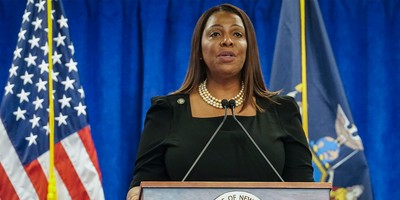President Barack Obama is naming names in his second term when it comes to his un-preferred media, something he generally farmed out to White House staff and political surrogates during the first term.
The president, in a recent interview with The New Republic, found scapegoats for Washington gridlock.
“One of the biggest factors is going to be how the media shapes debates,” Obama told TNR. “If a Republican member of Congress is not punished on Fox News or by Rush Limbaugh for working with a Democrat on a bill of common interest, then you’ll see more of them doing it.”
In the last White House press conference of his first term – one week before his second inauguration – Obama didn’t name names, but was clearly expressing the same sentiment when talking about the GOP’s “preferred” media.
“I think there are a lot of Republicans at this point that feel that given how much energy has been devoted in some of the media that’s preferred by Republican constituencies to demonize me, that it doesn't look real good socializing with me,” Obama told reporters.
Two days later, he unveiled his gun control agenda, and spoke about “pundits” among others “warning of a tyrannical, all-out assault on liberty -- not because that’s true, but because they want to gin up fear or higher ratings or revenue for themselves.”
Time will tell if this is foreshadowing for the second term of a willingness to go all out against talk radio and other pundits he might consider obstructionist to his progressive agenda. But at least three clear cut statements in two weeks does not seem coincidental.
Recommended
Just as the first inaugural address was not the unabashed progressive dogma of the second, the president did not directly engage conservative pundits in the first term.
For his part, Limbaugh scoffed at the argument.
“If it’s Fox News and me -- your harmless, lovable, little fuzzball host -- as the only things keeping the Republicans from finding meaning in life, by joining the Democrats, I'm not paid enough,” Limbaugh said. “I’m it. If I’m the last line, if I’m the bulwark.”
Calling Rush Limbaugh “the leader of the Republican Party” was later reported to be a Democratic strategy. But it was party surrogates and White House staff such as Robert Gibbs that pushed the phrase, never the president himself. Though there was a well-documented dustup between the White House and Fox News, the president kept his distance.
There is good reason for Obama and other Democratic politicians to go to war with talk radio, which has a history of blocking liberal legislation and influencing elections. Talk radio played a big role in driving voters in the congressional elections of 1994 and 2010, the recall election of California Gov. Gray Davis in 2003, blocking the immigration bill in 2007 and the rise of the Tea Party movement.
Interestingly enough, some in the GOP establishment are concerned these conservative talkers are as big a threat to the Republican Party’s electoral chances. Right after the November disaster, GOP strategist Steve Schmidt told Politico, “If you look at the Republican Party over the last couple of years, it is a tail-wag-the-dog story with the power and the influence of the conservative entertainment complex over elected leadership.”
Talk radio may indeed have influence, as listeners are very likely voters, according to the 2013 Talk Radio Research Project done each year by Talkers magazine. The survey found that 79 percent of talk radio listeners voted in the 2012 elections, far surpassing the general public. Moreover, it’s not a monolithic audience as 55 percent of the listeners identify themselves as independents, and just 42 percent identify themselves as either ultra-conservative or conservative.
Swing voters are generally not the highly engaged people who are repulsed or convinced by shows they’re unlikely to listen to. That said, the much-denounced entertaining and humor aspect of talk radio almost surely prompts some citizens to be engaged who previously were more apathetic. Given that talk radio is the only medium overwhelmingly controlled by the right, highlighting liberal failures, scandals and hypocrisy, it most definitely poses a bigger political problem for Democrats than the GOP.
That might be an incentive for Democrats to attack and reason for the Republican consultant class to focus their concerns elsewhere.
In a previous era National Review, Human Events and even The Wall Street Journal’s editorial page were not enough to match the New York Times-centric media universe of the three networks that shaped the political dialogue. By the early 1990s, Limbaugh had built an enormous audience that spawned an alternative media universe. To the degree politics has become more polarized, it is because there are two competing narratives where conservative candidates are not forced to debate entirely within the confines of the Times-centric boundaries.
Talk radio isn’t “running America,” as former Republican Sen. Trent Lott once griped. Nor is Limbaugh the “leader of the Republican Party.” If the first were true, Obama wouldn't be president. If the second were true, the last two GOP presidential nominees wouldn’t have been John McCain and Mitt Romney.
But we can definitively say the alternative media sphere was made possible largely by talk radio’s success, which has allowed more voices to be heard creating a livelier political dialogue. If he is looking for a fight, Obama may well find talk radio a tougher opponent than congressional Republicans.

























Join the conversation as a VIP Member